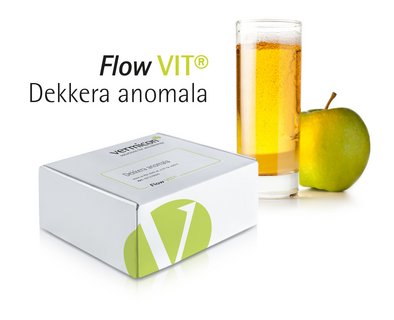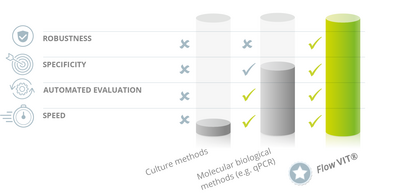Flow VIT® Dekkera anomala
Test kit for rapid and automated quantification of Dekkera anomala
(Brettanomyces anomalus) in wine and cider production samples.
Cider and sensory
Dekkera anomala, also known as Brettanomyces anomalus, frequently occurs in wine, especially cidre (sparkling apple wine), beer and soft drinks. Thereby, this yeast species is responsible for sensory defects in the final product.
Thanks to the cultivation-independent approach for direct detection of Dekkera anomala, the test kit enables rapid and reliable quality control of the bacterium at all stages of wine and cider production. The evaluation by flow cytometry is fully automated. An absolute quantification of the living Dekkera anomala cells present in the sample is available within a few minutes. Thus, they can be detected quickly, reliably and highly specifically.

Your Advantages
absolute quantification
automated evaluation
highest specificity
direct, cultivation-independent analysis
low detection limit
only viable Dekkera anomala are detected
perfect suited for routine analyses
Product specifications
| Detection of | Dekkera anomala (Brettanomyces anomalus) |
| Analyzable sample material, e.g. | Wine and esp. cider as well all stages of wine production |
| Technology | Flow VIT® |
| Evaluation | via VIT® adapted flow cytometer |
| Analysis type | direct, quantitative analysis |
| Additional functions | automated PDF report |
| Evaluation time | 3 minutes per sample |
| Scope of supply | analysis reagents product manual |
| Package size | 50 analysis |
Comparison with other technologies
With Flow VIT® Dekkera anomala detection of the yeast type Dekkera anomalais faster and easier than with conventional, cultre-based methods. Even viable, but non-culturable yeasts (VBNC) can be specifically detected and quantified. In contrast to other molecular biological methods, inhibitors in the sample material play no role with the direct analysis with Flow VIT®. Thanks to the VIT® gene probe technology, only living microorganisms are detected. False-negative as well as false-positive results are avoided.

Why does Dekkera anomala cause sensory defects?
Fruity-floral ciders are rich in acetate esters and poor in volatile phenols. Dekkera anomala, formerly known as Brettanomyces anomalus, is involved in both the synthesis of volatile phenols and the degradation of acetate esters. Both processes lead to a reduction of the fruity note in the cider.
Some representatives of the Dekkera / Brettanomyces genus are used in the fermentation of cider and craft beer and are particularly valued in the production of hard cider or fortified apple wine.
As Dekkera anomala is used both as a pest and as a beneficial bacterium, specific quality control is crucial to avoid sensory flavour defects and to maintain the fresh, fruity flavour.
